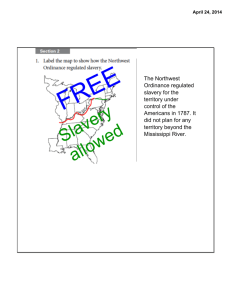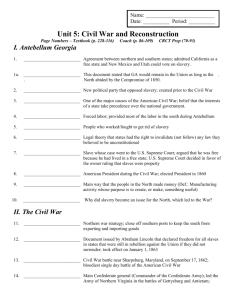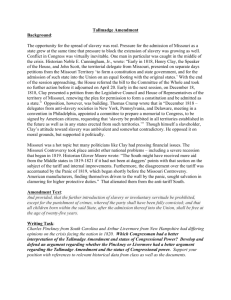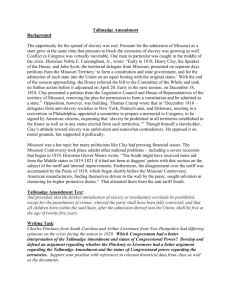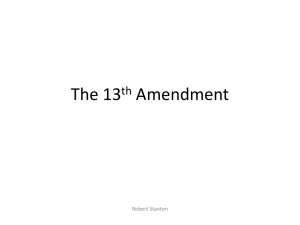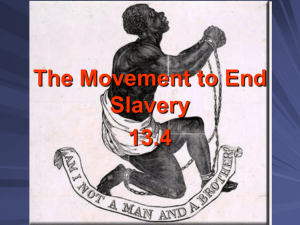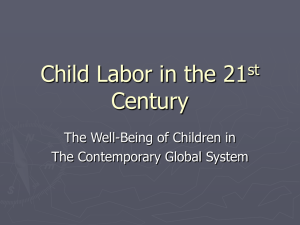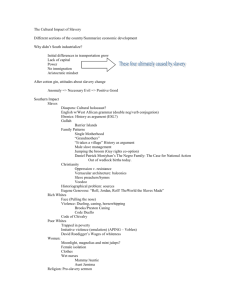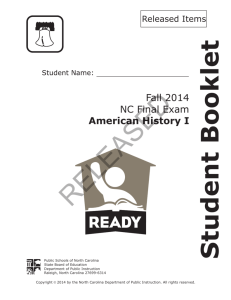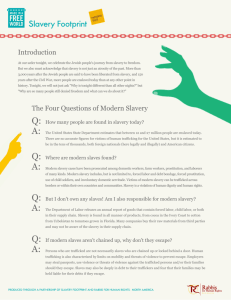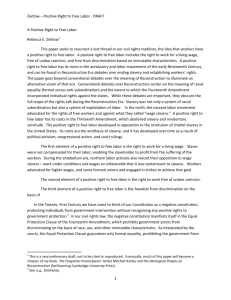Tht MISSOURJ COMP1OMISE
advertisement
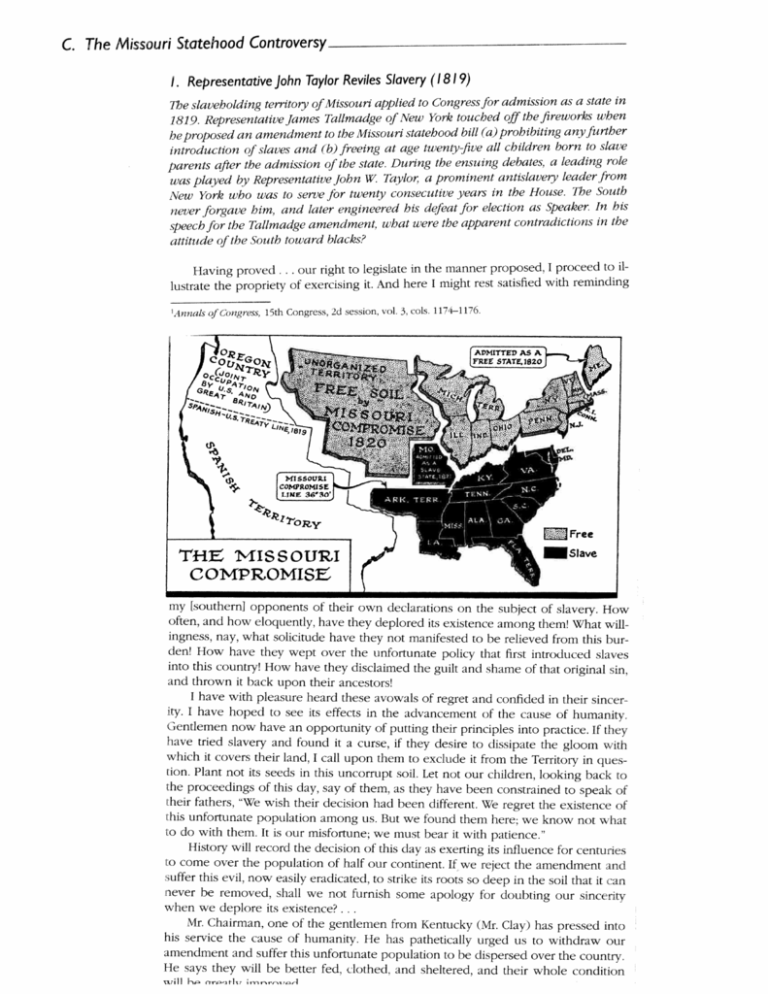
C. The Missouri Statehood Controversy _____-_---——-———--— —-——--———-——------ ——— I. Representative John Taylor Reviles Slavery (1819) The slaveholding territo;y of Missouri applied to Congress for admission as a state in 1819. RepresentatiVe James Tallmadge of New York touched off the fireworks when he proposed an amendment to the Missouri statehood bill (a) prohibiting anyfurther introduction of slaves and (b) freeing at age twenty-five all children born to slave parents after the admission of the state. During the ensuing debates, a leading role was played by Representative John W. Taplor; a prominent antislavey leader from New York who was to serve for twenty consecutive years in the House. The South never forgave him, and later engineered his defeat for election as Speaker. In his speech for the Tallmadge amendment, what were the apparent contradictions in the attitude f the South toward blacks? Having proved. our right to legislate in the manner proposed, I proceed to il lustrate the propriety of exercising it. And here I might rest satisfied with reminding . . .4nnals of congress, 15th Congress, 2d session, vol. 3, cols. 1174—1176. Tht MISSOURJ COMP1OMISE my [southern] opponents of their own declarations on the subject of slavery. How often, and how eloquently, have they deplored its existence among them! What will ingness, nay, what solicitude have they not manifested to be relieved from this bur den! How have they wept over the unfortunate policy that first introduced slaves into this country! How have they disclaimed the guilt and shame of that original sin, and thrown it back upon their ancestors! I have with pleasure heard these avowals of regret and confided in their sincer ity. I have hoped to see its effects in the advancement of the cause of humanity. Gentlemen now have an opportunity of putting their principles into practice. If they have tried slavery and found it a curse, if they desire to dissipate the gloom with which it covers their land, I call upon them to exclude it from the Territory in ques tion. Plant not its seeds in this uncorrupt soil. Let not our children, looking back to the proceedings of this day, say of them, as they have been constrained to speak of their fathers, “We wish their decision had been different. We regret the existence of this unfortunate population among us. But we found them here; we know not what to do with them. It is our misfortune; we must bear it with patience.” History will record the decision of this day as exerting its influence for centuries to come over the population of half our continent. If we reject the amendment and suffer this evil, now easily eradicated, to strike its roots so deep in the soil that it can never he removed, shall we not furnish some apology for doubting our sincerity when we deplore its existence?... Mr. Chairman, one of the gentlemen from Kentucky (Mr. Clay) has pressed into his service the cause of humanity. He has pathetically urged us to withdraw our amendment and suffer this unfortunate population to be dispersed over the country. He says they will be better fed, clothed, and sheltered, and their whole condition vull k. r”.t1cr 2. Representative Charles Pinckney Upholds Slavery (1820) Angered southerners spoke so freely of secession and “seas of blood” during the Mis souri debate that the aging Thomas Jefferson likened the issue to “a fire bell in the night” The argument inevitably involved the general problem of slavery, and the view of the South was eloquently presented, in a justly famous speech, by Rpresen tative Charles Pinckney of South Carolina. Vain, demogogic, and of questionable morals, he was nevertheless touched with genius. As one of the few surviving mem bers of the Philadeiphia Convention that hadframed the Constitution in 1787, and as South (‘arolina’sformer governor and U.S. senator Pinckney was in aposition to command attention. What is the most alarming aspect of the speech? A great deal has been said on the subject of slavery: that it is an infamous stain and blot on the states that hold them, not only degrading the slave, but the master, and making him unfit for republican government; that it is contrary to religion and the law of God; and that Congress ought to do everything in their power to prevent its extension among the new states. is there a single line in the Old or New Testament either censuring Now, sir, or forbidding it [slavery]? I answer without hesitation, no. But there are hundreds Hagar, from whom millions sprang, was an speaking of and recognizing it.. . . . . . African slave, brought out of Egypt by Abraham, the father of the faithful and the beloved servant of the Most High; and he had, besides, three hundred and eighteen male slaves. The Jews, in the time of the theocracy, and the Greeks and Romans, had all slaves; at that time there was no nation without them. If we are to believe that this world was formed by a great and omnipotent Being, that nothing is permitted to exist here but by his will, and then throw our eyes throughout the whole of it, we should form an opinion very different indeed from that asserted, that slavery was against the law of God. It will not be a matter of surprise to anyone that so much anxiety should be shown by the slaveholding states, when it is known that the alarm, given by this at tempt to legislate on slavery, has led to the opinion that the very foundations of that kind of property are shaken: that the establishment of the precedent is a measure of For, should succeeding Congresses continue to push the most alarming nature. it, there is no knowing to what length it may he carried. Have the Northern states any idea of the value of our slaves? At least, sir, six hundred millions of dollars. If we lose them, the value of the lands they cultivate will be diminished in all cases one half, and in many they will become wholly use less. And an annual income of at least forty millions of dollars will be lost to your . . . citizens, the loss of which will not alone be felt by the non-slaveholding states, but by the whole Union. For to whom, at present, do the Eastern states, most particu larly, and the Eastern and Northern, generally, look for the employment of their shipping, in transporting our bulky and valuable products [cotton], and bringing us the manufactures and merchandises of Europe? Another thing, in case of these losses being brought on us, and our being forced into a division of the Union, what becomes of your public debt? Who are to pay this, and how will it be paid? In a pecuniary view of this subject, therefore, it must ever he the policy of the Eastern and Northern states to continue connected with us. But, sir, there is an infinitely greater call upon them, and this is the call of justice. of affection, and humanity. Reposing at a great distance, in safety, in the full enjoy ment of all their federal and state rights, unattacked in either, or in their individual rights, can they, with indifference, or ought they, to risk, in the remotest degree, the consequences which this measure may produce? These may be the division of this Union and a civil war. Knowing that whatever is said here must get into the public prints, I am unwilling, for obvious reasons, to go into the description of the horrors which such a war must produce, and ardently pray that none of us may ever live to witness such an event.
